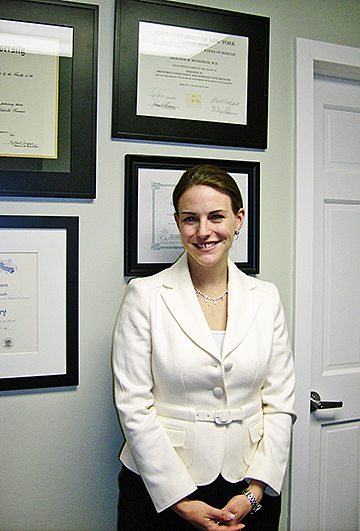
|
|
Vol. LXIII, No. 10
|
|
Wednesday, March 11, 2009
|
 PROBLEM-SOLVER: “This field is under-served. At some point, 50 percent of all women have conditions, such as incontinence, over-active bladders, bladder infections, and prolapsed bladders. One of our biggest challenges is that people have these problems and don’t know there’s a treatment.” Dr. Heather van Raalte, Director of Princeton Urogynecology, wants to help women with these problems to find the right treatment. |
“I was always interested in science,” reports Dr. Heather van Raalte, Director of Princeton Urogynecology. “In college, I focused on marine biology, but I realized that I wanted to work more directly with people.”
That interest led her to medical school at Vanderbilt University and to a residency in obstetrics/gynecology at Stony Brook University Hospital in Long Island. “I was very interested in women’s health, and I went into ob/gyn. Within that field, there are four sub-specialties, one of which is urogynecology.” explains Dr. van Raalte. “This focuses on pelvic floor disorders, such as bladder and bowel control issues, voiding difficulties, recurrent urinary tract infections, and pelvic organ prolapse.”
Such problems have been under-treated — sometimes because women have been reluctant to seek help, she notes, and Dr. van Raalte decided to specialize in this field, with the express purpose of helping more women realize that a variety of treatment options for such conditions is available.
She completed a 3-year fellowship at the Institute for Female Pelvic Medicine & Reconstruction Surgery in Pennsylvania, with a surgical focus on minimally invasive techniques. Last October, she opened Princeton Urogynecology in Princeton Professional Park at 601 Ewing Street.
Success Rates
There is so much more that can be done for these conditions today, she reports. Medicine, diet, life-style, and minimal invasive surgery are all ways to treat a variety of problems. Facts about prolapse (dropped pelvic organs) and incontinence include:
• 13 million Americans are incontinent — 85 percent of them are women.
• It is estimated that one in four women ages 30 to 59 have experienced an episode of urinary incontinence.
• Approximately 80 percent of those affected by urinary incontinence can be cured or improved. Despite the high success rates in treating incontinence, only one out of every 12 people affected seek help.
• Half of all women over age 50 experience some degree of pelvic organ prolapse. 20 percent of women over 60 will require some surgical intervention.
* Symptoms of pelvic prolapse include loss of bladder or bowel control, difficulty voiding, urinary frequency, bowel problems, feelings of pelvic heaviness, bulging, fullness, and recurrent bladder infections.
Such conditions vary in severity, and Dr. van Raalte recommends a thorough examination and medical history evaluation to determine the best course of treatment. “I want people to know they can be helped. In the case of incontinence, 50 percent of women are affected to a point where it interferes with their life-style. Some people have dealt with it for decades. Women are incredible about adapting. They adjust to the situation, but they may have cut out enjoyable activities with family and friends and doing things they like.
“Bladder control is such a big problem,” she continues. “Stress incontinence, such as experienced with coughing, sneezing, laughing, and heavy lifting, is a condition that is also a common problem among athletes.”
Over-Active
Over-active bladders, infections, including cystitis and interstitial cystitis, are all conditions treated by Dr. van Raalte, and they can affect women of all ages. “My patients are teens up to age 94. In the case of bladder problems, sometimes diet plays a part. There are certain foods and beverages that can irritate the bladder. Alcohol, caffeinated beverages, chocolate, very acidic fruit or fruit juices, tomatoes, spicy foods, and milk products are among those that may cause a problem.”
Not every item will bother every person, she adds, so eliminating one food at a time is a good way to determine if it makes a difference.
In addition, drinking the appropriate amount of fluid is advisable. Drinking water when thirsty is the best rule of thumb, and generally, four to six glasses a day are recommended. Too much water can overload the bladder.
Pelvic prolapse is another condition that Dr. van Raalte treats. “There is no single cause of prolapse, but there are certain risk factors such as child-bearing, heavy lifting, exercise, life-style issues, obesity, and genetics,” she explains. “In the past, treatment included a hysterectomy, but now it can be non-surgical treatment. If surgery is indicated, it is now minimally invasive — not abdominal — and with regional anesthesia.”
New Technology
Incontinence surgery can be done as an out patient, she notes.
“Urogynecology is a rapidly-changing field. A lot of new technology and new techniques are involved,” she explains. “I am active in pelvic floor research, and I currently serve as a consultant for the engineers who are developing newer products. You must keep up to date with the latest advances.”
A strong advocate for women’s health issues, Dr. van Raalte participates as a volunteer surgeon for Mercy Ships, serving women in Africa who have pelvic floor injuries caused by childbirth. This May, she will travel to Benin to help women there for two weeks.
“What I enjoy most about my work is helping to improve someone’s quality of life, so they can resume their normal activities, and get back to their life. This is the first practice in Mercer County dedicated solely to urogynecology, and it is wonderful when people realize they can be helped. Then, they tell their friends, and we’re getting a lot of word-of-mouth. I look forward to helping as many women as possible have a normal life.”
Dr. van Raalte sees patients Tuesday and Friday 9 to 4, Thursday 9 to 12. She is affiliated with the University Medical Center at Princeton. Medical insurance companies cover all or most of the costs of evaluations and treatments. (609) 924-2230. Website: www.princetonurogyn.com.